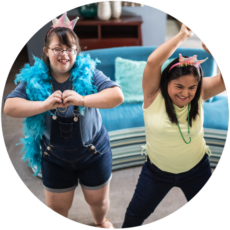
What To Do When Your Child Feels Left Out
As a parent, few things are more heartbreaking than watching your child struggle to make friends.
Maybe they come home from school feeling left out. Maybe they’ve never had that “best friend” everyone talks about. Perhaps you’ve watched them try and fail to connect with others, and you’re unsure how to help.
If your child has a disability, these experiences can feel even more isolating. And it’s okay to admit that this is hard. You’re not alone in feeling that ache.
But there is hope. And there are ways to support your child as they build real, meaningful friendships with people who understand and accept them for exactly who they are.
Why Friendship Matters
Friendships aren’t just a “bonus” in life; they are essential to emotional and physical well-being. Research shows that strong, positive relationships can help reduce stress, lower blood pressure, and improve mental health.
Yet for many children, teens, and even adults with disabilities, making and keeping friends often comes with extra challenges:
- Needing to explain differences
- Facing social barriers or physical limitations
- Navigating environments that aren’t always inclusive
Friendship may take more effort, but it is possible and incredibly worthwhile.
What Adults with Disabilities Wish Families Knew
Sometimes the best advice comes from people who’ve lived it.
Members of the Diversability Leadership Collective, a group of adults with disabilities dedicated to fostering inclusion, shared their personal experiences around friendship. They spoke honestly about rejection, being misunderstood, and the pain of feeling invisible, but they also shared what helped them the most.
Their insights can offer hope and direction for both you and your child.
1. Encourage Your Child to Be Themselves
Let your child know that they don’t need to hide their disability or act differently to make friends. True friends will accept all of who they are, including their needs, personality, and strengths.
“Be yourself, be honest. Let them know about your disability and what you might need. See if they’re here for you.” – Keisha
Authenticity builds trust. When your child feels safe being themselves, they’re more likely to form meaningful connections based on mutual respect, not pressure to “fit in.”
2. Look for Activities That Match Their Interests
The best friendships often start with a shared interest. Whether it’s Pokémon, painting, gaming, animals, dance, or theater, shared activities create a natural path to connection.
Encourage your child to join clubs, classes, or programs where they’ll find others who love the same things. These settings can help take the pressure off socializing and let friendships grow more organically.
3. Explore Safe Online Communities
If in-person interactions are difficult, don’t overlook the power of online friendships. For many in the disability community, virtual spaces offer safety, inclusion, and genuine connection.
Look for moderated, age-appropriate forums or social groups where your child can safely interact with others. These friendships can be just as real and impactful as face-to-face ones.
“Some of my closest friendships started online. I found people who really understood me.” – Nico
4. Help Them Find People Who Truly “Get It”
Friends who also have disabilities may offer a deeper level of empathy. They understand what it’s like to need extra help, cancel plans unexpectedly, or feel excluded, and that shared experience can feel grounding.
“Disabled people will understand when you have to change plans. They’re more likely to support you and listen.” – Nico
Encouraging friendships within the disability community can provide not just social connection, but emotional validation and strength.
5. Teach Your Child to Choose Respectful Friends
Friendships — whether with disabled or non-disabled peers should be built on mutual respect, kindness, and openness.
Let your child know that it’s okay if someone needs time to learn about their disability, as long as they’re willing to listen, grow, and treat them with dignity.
“Make friends who don’t talk down to you, who see your challenges but don’t minimize them.” – Puneet
It’s important to help your child recognize red flags (like being patronized or excluded) and know they deserve friends who lift them up, not tear them down.
Final Thoughts for Parents
Supporting your child through social struggles no matter their age, is not easy. There may be setbacks, disappointments, and days that leave you wondering if things will ever get better.
But friendship is possible. Your child can find people who truly care and your support is one of the biggest reasons why.
Keep showing up. Keep encouraging their voice, their strengths, and their right to be included. You are doing the hard, beautiful work of helping them build a life full of connection, confidence, and community.
RESOURCES
Friendships and Social Skills for Children With Disabilities and Special Health Care Needs
Friendship Circle: Why Social Connection Matters More Than Ever (Especially for Kids With Disabilities)
Raising Anti-Ableist Kids Part 1: Disability-Inclusive Books







